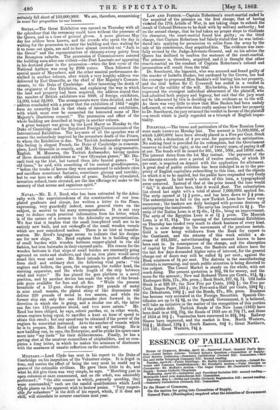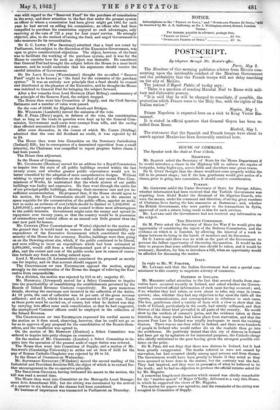ESSENCE OF PARLIAMENT.
Houtz or Conn.:ma, Monday, April 28.—Reserved Fund : General Peel's gins- tion.—Local Indian Armies : Colonel Sykes's Question.—Committee of Supply : Civil Service Estimates.—Summary Jurisdiction (Ireland Bill: Committee.—Red Sea and India Telegraph Company Bill: Second reading.
Tuesday, April 29.—Public Buildings Mr. Baillie Cochrane's motion,—biland Re- venue and Customs Establishments : Mr. Horsfall's motion.—Petty Charges on Commerce : Mr. Moffatt's motion.—The Sugar Duties : Mr. Crawfurd's motion.— Supply : Roman Catholic Chaplains. Wednesday, April 30.—Industrial and Provident Societies Bill : second reading.— Metropolis Local Acts Amendment Bill : Committee Thursday, May L—Birtha and Deaths (Ireland) Registration BID: second reading . —Summary Jurisdiction (Ireland) Bill: Committee.
IN the House of Commons,
On the motion for going into Committee of Supply,
General PEEL (Huntingdon) enquired what the intention of Government
was with regard to the "Reserved Fund" for the purchase of commissions in the army, and drew attention to the fact that under the present system an officer to whom a commission had been given might get 1001. for each year he had served on selling his commission; an officer who had Veen compelled to purchase his commission enjoyed no such advantages, only receiving at the rate of 721. a year for four years' service. He strongly objected, also, to the method of raising the fund, and urged Government to take measures for its reconstitution.
Sir G. C. LEvits (War Secretary) admitted that a fund not voted by Parliament, but subject to the discretion of the Executive Government, was open to grave constitutional objections. The object, however, of the fund was to facilitate the working of the purchase system, and it was for the House to consider how far such an object was desirable. He considered that General Peel had brought the subject before the House in a most lucid manner, and he would undertake that his arguments should receive the careful attention of Government
Sir Da LACY EVANS (Westminster) thought the so-called "Reserve Fund" ought to be known as "the fund for the extension of the purchase system." It was an entirely new principle that a fund should be created and distributed at the pleasure of the Executive, and he thought the House was indebted to General Peel for bringing the subject forward.
After a few remarks from Lord Hortukat (East Riding) condemnatory of the principle of the Reserve Fund, the subject dropped.
The House then went into Committee of Supply, and the Civil Service Estimates and a number of votes were passed.
On the vote of 50001. for Highland Roads and Bridges,
Mr. WILLIAMS (Lambeth) moved the omission of the vote.
Mr. F. PEEL (Bury) urged, in defence of the vote, the consideration that as long as the roads in question were kept up by the General Com- mission, Government mail-carts were exempt from tolls, and the saving
• thus effected amounted to 25001. a year.
After some discussion, in the course of which Mr. Canto (Stirling) admitted that the vote did Scotland no credit, it. was rejected by 48 to 24.
The House then went into Committee on the Summary Jurisdiction (Ireland) Bill; but in consequence of a determined opposition from a small minority, the Chairman was compelled to report progress before clause 5 had been passed.
The House then adjourned.
In the House of Commons,
Mr. COCHRANE (Honiton) moved for an address for a Royal Commission to inquire into the state of all public buildings erected within the last twenty years, and whether greater public convenience would not be better consulted by the adoption of more comprehensive designs. Without wishing to convey any reflection on the conduct of any recent First Com- missioner of Works, he maintained that the whole system of our public buildings was faulty and expensive. He then went through the entire list of our principal public buildings, showing their enormous cost and yet in- sufficient accommodation. He proposed that, if the House should agree to his motion, the Royal Commission should inquire as to the amount of space requisite for the concentration of the public offices, appoint an archi_ tact to make an estimate of cost (which should be limited to 1,200,000L or 1,500,0001.), and report on the plan that seemed to them most advantageous to the public interests. Government might raise the money and spread its repayment over twenty years, so that the country would be in possession of commodious and central offices at an annual cost little greater than the rent now paid for houses.
Mr. COWPER (First Commissioner of Works) objected to the motion on the ground that it would tend to remove that definite responsibility for expenditure of the Executive Government which constituted the only security of the House for due economy. Besides, buildings were then going on on the Downing-street site, which, if the public continued to be liberal, and were willing to incur an expenditure which had been estimated at 5,000,0001., would still form a well-harmonised part of a comprehensive Oen, and the extent and cost of the public works now in course of execu- tion forbade any fresh ones being entered upon.
Lord J. MANNERS (N. Leicestershire) considered the proposal as merely one for inquiry, and on that account should support it.
The CHANCELLOR OF THE EXCHEQUER opposed the motion, urging strongly on the consideration of the House the danger of relieving the Exe- cutive from responsibility.
On a division, the motion was rejected by 116 to 49; majority 67.
Mr. HORSFALL (Liverpool) moved for a Select Committee to inquire into the practicability of consolidating the establishments governed by the Boards of Inland Revenue Customs respectively. He gave numerous details, showing the enormous cost incurred in the collection of the duties. At 19 ports, the cost of collection was 44 per cent. of the gross revenue collected; and at 21, which he named, it amounted to 279 per cent. Trade at those ports must be carried on, of course, but what he desired was that by carrying into effect some such consolidation as that he had suggested, the unemployed Customs' officers could be employed in the collection of the Inland Revenue.
The CHANCELLOR OF THE EXCHEQUER expressed his cordial assent to the motion as it then stood, observing, however, that he could not go so far as to approve of any proposal for the consolidation of the Boards them- selves, and the reseution was agreed to.
On the motion of Mr. Moeeterr (Honiton) a Select Committee was ordered to inquire into petty charges on commerce.
On the motion of Mr. CRAUFORD (London) a Select Committee to in- quire into the operation of the present scale of sugar duties was ordered.
The House then went into Committee of Supply, and a motion of Mr. SEtwrtt's (Cambridge University) to strike out an item of 5501. for the pay of Roman Catholic Chaplains was rejected by 88 to 16.
In the House of Commons on Wednesday.
Mr. SorcEaccv-Esrcourvr (Wiltshire) moved the second reading of the Industrial and Provident Societies Bill, the object of which is to extend fur- ther encouragement to the co-operative principle.
The SOLICITOR-GENERAL having intimated his assent to the motion, the bill was read a second time.
The House then went into Committee on the Metropolis Local Manage- ment Acts Amendment Bill; but the sitting was terminated by the arrival of a quarter to six before all the clauses had been considered.
No business of importance was transacted in Parliament on Thursday.































 Previous page
Previous page